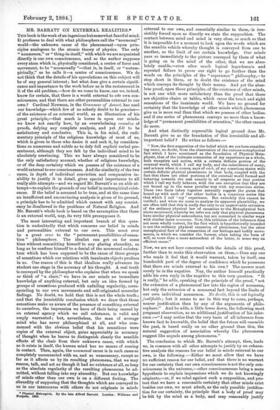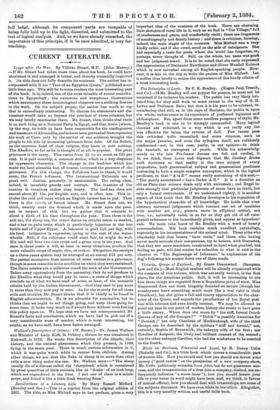MR. BARRATT ON EXTERNAL REALITIES.*
inns book is the work of an ingenious butsomewhat fanciful mind. It professes to deal with what philosophers call the "noumenal" world—the unknown cause of the phenomenal—upon prin- ciples analogous to the atomic theory of physics. The only " noumenon," or "thing-in-itself," with which we are acquainted directly is our own consciousness, and so the author supposes every atom which is, physically considered, a centre of force and movement, to be " noumenally "—that is, in itself, or " metem- pirically," as he calls it—a centre of consciousness. We do not think that the details of his speculations on this subject will be of any general interest; but what does give a certain signifi- cance and importance to the work before us is the restatement in it of the old problem,—how do we come to know, can we, indeed, know for certain, that there is a world external to our own con- sciousness, and that there are other personalities external to our own P Cardinal Newman, in the Grammar of Assent, has used our knowledge—which few of us soberly doubt to be genuine— of the existence of an external world, as an illustration of his great principle,—that much is borne in upon our minds, we know not exactly how, by an overwhelming cunttaus of proofs, defying any complete analysis, and yet felt to be satisfactory and conclusive. This is, in his mind, the rudi- mentary principle of the religions knowledge of most of us, which is given to those who desire it and seek it, by considera- tions so numerous and subtle as to defy full explicit verbal pre- sentment, although they are felt by the individual mind to be absolutely convincing. This we have always considered to be the only satisfactory account, whether of religious knowledge, or of the deep certainty which we possess of the existence of a world external to our consciousness. And the similarity of the two cases, in depth of individual conviction and comparative in- ability to justify it in detail, gives special importance to all really able attempts—and we regard Mr. Barratt's as an able at- tempt—to explain the grounds of our belief in metempirical exist- ences. If the belief is assumed to be true, and at the same time an insufficient and unconvincing analysis is given of its ground, a principle has to be admitted which cannot with any consist- oncy be disallowed in the problems of Natural Religion. And Mr. Barratt's whole book is based on the assumption that there is an external world, nay, its very title presupposes it.
The most interesting and important branch of this ques- tion is undoubtedly that which concerns our belief in minds and personalities external to our own. This must ever be a great crux to the " permanent-possibilities-of-sensa- tion " philosophers. The idealist can get on for some time without committing himself to any glaring absurdity, so long as he confines himself to a denial of the noumenal substra- tum which has been supposed to be the cause of those groups of sensations which our relations with inanimate objects produce in us. One reason of this is that idealism really advances its student one stage in the accuracy of his thought. A real truth is conveyed by the philosopher who explains that when we speak or think of "a chair," we have in our minds no immediate knowledge of anything external, but only an idea formed by groups of sensations produced with unfailing regularity, corre- sponding to our own movements and self-originated muscular feelings. No doubt, we hold that this is not the whole truth ; and that the irresistible conclusion which we draw that those sensations make us aware of the presence of something external to ourselves, the impression we have of their being caused by an external agency which we call substance, is valid and amply warranted ; but, nevertheless, the man of average mind who has never philosophised at all, and who com- menced with the obvious belief that his sensations were copies of the external object, gains appreciably in accuracy of thought when he learns to distinguish clearly the sensible effects of the chair from their unknown cause, with which as it exists in itself, the human mind has no means of coming in contact. Then, again, the noumenal cause is in such cases so completely unconnected with us, and so unnecessary, except so far as it affects us by its resulting phenomena, that we may reason, talk, and act as though it had no existence at all, so long as the absolute regularity of the resulting phenomena be ad- mitted, without falling into any absurdity. But our knowledge 'øf minds other than our own is on a different footing. The a'bsurdity of supposing that the thoughts which are conveyed to us in our intercourse with others do not originate in minds
• Physioel Metempide. By the late Alfred Barrett. London: Williams and Norgate. 1888.
external to our own, and essentially similar to them,-is irre- sistibly forced upon us directly we state the supposition. The
contact between mind and mind is very close, so much so that it is impossible for a moment to look upon the words which are the sensible vehicle whereby thought is conveyed from one to another, as the limit of our certain knowledge. Our minds pass so immediately to the. picture conveyed by them of what is going on in the mind of the other, that we are abso- lutely unable,—even after much logical legerdemain and repeated failure to prove our right to go further than the words on the principles of the "experience" philosophy,—to stop short in them, or to doubt the existence of the mind which conveys its thought by their means. And yet the abso- lute proof, upon those principles, of the existence of other minds, is not one whit more satisfactory than the proof that there are objective chairs or tables, which cause the touch and sight sensations of the inanimate world. We have no ground for certainty that the knowledge of other minds which phenomena give us is more real than that which we possess of other bodies, and if one series of phenomena conveys no more than a know- ledge of "permanent possibilities of sensation," the other cannot do more.
And what distinctly expressible logical ground does Mr. Barratt give us as the foundation of this irresistible and all- important belief ? He writes as follows :—
." Now, the first suggestion of the belief which we are here consider- ing came, no doubt, from the observation of the curious metaphysical fact which I have mentioned as the foundation of Physical Meta- physic, that of the intimate connection of my experience as a whole, both receptive and active, with a certain definite portion of the external world, which I call my body, and the coincidence of many, and science when it comes, says of each, of my conscious states with certain definite physical phenomena in that hody, coupled with the fact that there are other portions of the external world formed and behaving towards the rest exactly in all respects as that portion which I call my body behaves, with the one exception that they are not bound up in the same peculiar way with my conscious series. These two facts taken together naturally suggest the guess that bound up with each of the other bodies is a conscious series like that which I call ' my ' experience. But unluckily this cannot be verified ; and when we come to analyse its apparent plausibility, we are often told that this is really due only to an unproveable extension of the ordinary physical law of causation to the Metaphysical fact above mentioned, whereby we infer not only that physical phenomena have similar physical antecedents, but are connected in similar ways with similar inner nounsena. Now, this criticism of the inference does not seem wholly correct, for the fact which is hypothetically intended is not the ordinary physical causation of phenomena, but the other metaphysical fact of the connection of our feelings and bodily move- ments, in which we consider the former, when taking the form of will, as more than a mere antecedent of the latter, in some way an efficient cause."
Now, we are not here concerned with the details of this proof, further than to make this observation on them,—Does any one
who reads it feel that it would warrant, taken by itself, one
hundredth part of the degree of confidence which he possesses that there are minds external to his own ? The answer must surely be in the negative. Nay, the author himself practically adds his own reply in the negative to this very question. "It
is really," he adds, speaking of the principle of the proof, "not the extension of a phenomenal law into the region of noumena, but only the extension of a noumenal fact beyond the limits of our own individual noutnenon. No doubt, this is not logically justifiable; but it seems to me in this way to come, perhaps, nearer justification than by any of the arguments of philo- sophers." And he adds, a little lower down, the following most pregnant observation, as an additional justification of his infer- ence :—"I may notice that the very basis of all inference from known fact to knowable, the belief that the future will resemble the past, is based really on no other ground than this, the natural suggestion. of association whereby like phenomena suggest like sequels among phenomena."
The conclusion to which Mr. Barratt's attempt, then, leads us, in common with all other attempts to justify by an exhaus- tive analysis the reasons for our belief in minds external to our
own, is the following :—Either we must allow that we have no sufficient reason for our belief, and that there is no warrant for our certainty that our own consciousness is not the only con- sciousness in the universe,—other conscionsnesses being a mere hypothesis to explain impressions which we do not knowingly originate,—or, if we rebel against such a supposition, and pro- test that we have a reasonable certainty that other minds exist besides our own, we must admit, as the only possible justifica- tion for our certainty, the principle that a body of proof may be felt by the mind as a body, and may reasonably justify
full belinf, although its component parts are incapable of being fully held up to the light, dissected, and submitted to the test of logical analysis. And, as we have already remarked, the importance of this principle, if it be once admitted, is very far- reaching.



































 Previous page
Previous page